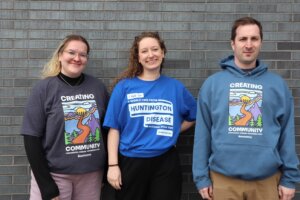Strengthening Waterloo’s Innovation Corridor
MEDI students craft bold visions for a vibrant David Johnston Research + Technology Park This story was originally published on…
Founded in Cambridge, Ontario, in 1973 by Ariel and Ralph Walker, the Huntington Society of Canada has been working to improve the quality of life of those affected by Huntington disease. The non-profit provides support through social workers, access to educational resources, driving awareness of the disease, and investing in promising research directly related to Huntington disease.

“Huntington disease is an inherited neurodegenerative disorder often described as having symptoms resembling Alzheimer’s disease, Parkinson’s disease, schizophrenia, and ALS,” says Alexander Maxan, Director of Research and Strategic Partnerships. “It typically develops in a person’s 30s or 40s and, unfortunately, progresses to death within about 15 to 20 years. There is no cure.”
The disease is named after American physician George Huntington, who first wrote about its symptoms in 1872. In 1993, the gene mutation that leads to Huntington disease was identified, which led to the first genetic test for the disease. Maxan says that while there have been some potential breakthroughs, there is still no available therapy to treat Huntington disease.
In Canada, the disease affects one in 7,000 people. However, one out of every 1,000 family members can be affected by the disease, including those who may carry the gene mutation.
“Being in the R+T Park creates opportunities for collaboration. Being part of the research environment here feels like a good reflection of the work we do with universities across Canada.”
~Shelly Redman, CEO of the Huntington Society of Canada
“The hereditary nature of the disease means that if someone has a parent with Huntington disease, they have a 50/50 chance of inheriting the gene mutation. They may choose to undergo genetic testing or not. This is a personal decision, and it results in it being challenging to know the exact number of cases of Huntington disease,” says Maxan.
Shelly Redman, CEO of the Huntington Society of Canada, says one of the key roles of the society’s social workers is guiding people through the decision to get tested. Some people who choose to get tested will delay accessing their results. For those who test negative, there can be a sense of “survivor’s guilt”.

“This is a disease that targets families. There can be five or six siblings who test negative, and one tests positive – or the other way around. Then, there are the caregivers. We often say Huntington disease is a rare disease, but when you look at the number of people who are affected, it’s not that rare at all,” Redman says.
While no treatment is available today, Redman and Maxan say providing education and hope is critical to helping those affected by the disease and their caregivers. One way to help is by funding research to find treatments. Proximity to the University of Waterloo is one of the core reasons they chose the R+T Park.
“Being in the R+T Park creates opportunities for collaboration. Being part of the research environment here feels like a good reflection of the work we do with universities across Canada,” Redman says.
There are over 30 Huntington disease researchers across Canada, with many working in Southwestern Ontario at McMaster University, the University of Toronto, Western University, the University of Guelph, and UWaterloo.
“Dr. Dale Martin at UWaterloo and Dr. Melanie Alpaugh and Dr. Shaun Sanders at the University of Guelph were the recipients of our $150,000 Navigator Award last year. Being able to be near them and support them is critical to our work. They give their time providing lab tours for our donors to help showcase the progress being made,” Maxan says.
One new area of research is the biological mechanisms behind Huntington disease that Maxan says may lead to a new class of drugs.
“For years, research focused on lowering mutant huntingtin protein levels. Now, scientists are exploring other mechanisms, such as DNA damage repair pathways, which may lead to a new class of therapies. Several promising disease-modifying treatments are expected to enter clinical trials in the coming years,” Maxan says. “There’s a lot of cautious optimism. The field has expanded significantly, offering hope to those affected. ”
Visit huntingtonsociety.ca to learn more about the Huntington Society of Canada and its support and research-funding programs. To learn more about research, contact Alexander Maxan at amxan@huntingtonsociety.ca. For information on partnerships and collaborations, contact Shelly Redman at sredman@huntingtonsociety.ca.
To meet staff and board members, along with researchers and community members, visit the Huntington Society of Canada’s drop-in open house on Thursday, April 10, from 4 p.m. to 7 p.m. at 375 Hagey Blvd, Suite 114.